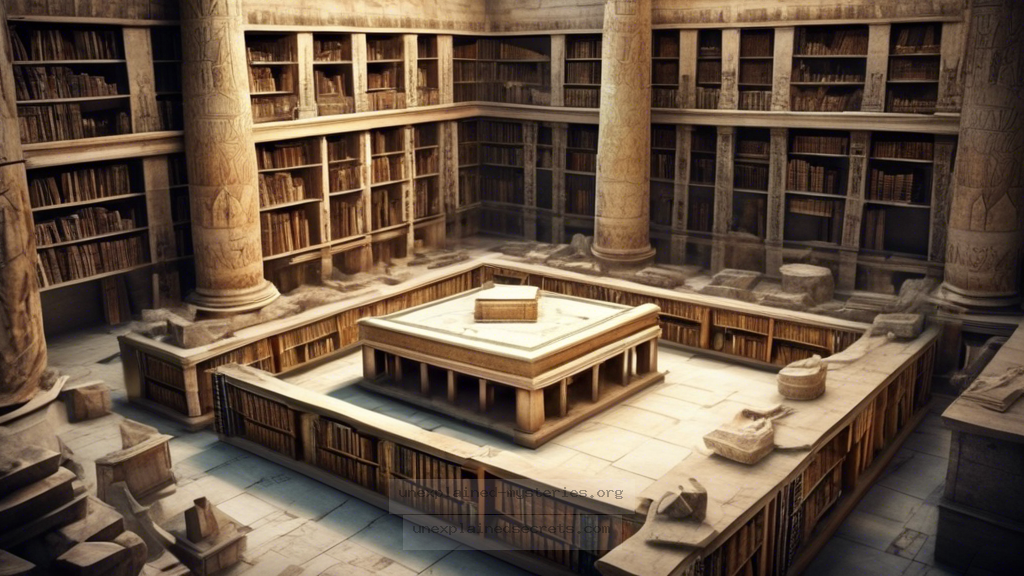What Happened to the Lost Library of Alexandria, and Why Does It Matter Today?
What Happened to the Lost Library of Alexandria, and Why Does It Matter Today?
The Lost Library of Alexandria stands as one of the most tantalizing mysteries in the annals of history. It was once a beacon of knowledge, housing countless scrolls and texts that chronicled the wisdom of the ancient world. But what exactly happened to this monumental repository of learning? And why does its disappearance still resonate in our quest for knowledge today? Understanding the fate of the Library of Alexandria not only sheds light on ancient civilization but also raises pressing questions about the preservation of knowledge and the consequences of its loss.
Historical Context of the Library of Alexandria
The Library of Alexandria, located in the city of Alexandria in Egypt, was founded in the 3rd century BCE during the reign of Ptolemy I Soter. It was part of a larger research institution known as the Mouseion, dedicated to the Muses, the goddesses of the arts and sciences. At its zenith, the library is estimated to have contained hundreds of thousands of scrolls, making it the largest and most significant library of the ancient world. Scholars from various cultures, including Greeks, Egyptians, Jews, and Persians, gathered there to study and exchange ideas.
The library’s mission was ambitious: to collect all the knowledge of the known world. It is said that Ptolemy II Philadelphus even sent agents to procure texts from across the Mediterranean, including works from Homer, Plato, and many others. The library became a symbol of intellectual achievement and cultural diversity, fostering an environment of inquiry that was unparalleled in the ancient world.
Core Concepts and Theories Surrounding Its Fate
Despite its grandeur, the fate of the Library of Alexandria remains shrouded in mystery. Several theories have emerged over the centuries regarding its destruction:
- The Fire of Julius Caesar (48 BCE): One of the earliest accounts suggests that during Julius Caesar’s siege of Alexandria, a large part of the library was accidentally burned. This incident likely resulted in the loss of many texts, but not necessarily all of them.
- The Aurelian Campaign (270-275 CE): Roman Emperor Aurelian’s military campaign against Queen Zenobia of Palmyra is another potential culprit. The fighting could have led to further destruction of the library’s holdings.
- The Rise of Christianity (4th Century CE): As Christianity became the dominant religion, some historians propose that early Christians viewed the library’s works as pagan and actively sought to destroy them.
- Islamic Conquest (642 CE): Another theory attributes the library’s ultimate demise to the Muslim conquest of Alexandria. However, historical evidence for this claim remains scant.
The debate continues among historians, with some arguing that the library’s decline was gradual rather than the result of a single catastrophic event.
Practical Implications of the Library’s Loss
The loss of the Library of Alexandria represents more than just the disappearance of ancient texts; it symbolizes a significant setback in human knowledge and culture. The implications of this loss are profound:
- Loss of Knowledge: Many texts that could have advanced science, philosophy, and literature were lost forever. This contributes to the phenomenon known as the “Dark Ages,” where intellectual progress stagnated in Europe.
- Impact on Future Generations: The absence of foundational texts hindered the development of various fields, from mathematics to astronomy, delaying advancements that might have occurred centuries earlier.
- Lessons on Preservation: The fate of the library serves as a reminder of the importance of preserving knowledge. Modern libraries and archives are now more aware of the need for conservation and protection against disasters.
Notable Fact: The Library of Alexandria is often mythologized in modern culture, appearing in literature, films, and video games, symbolizing the importance of knowledge and the tragedy of loss.
Alternative Perspectives on the Library’s Fate
While many historical accounts suggest a catastrophic end for the Library of Alexandria, alternative perspectives exist. Some scholars argue that the library may not have been a singular institution but rather a collection of various libraries and archives throughout Alexandria. This view posits that while some parts may have been lost, others could have survived in different forms or locations.
Furthermore, the notion that all knowledge was contained within the library is misleading. Many works were replicated and distributed across the Mediterranean, which could mean that the loss, while significant, was not absolute. This perspective encourages a broader understanding of knowledge dissemination in the ancient world.
Common Misconceptions About the Library
Several misconceptions persist about the Library of Alexandria, clouding our understanding of its history and significance:
- All texts were lost: Many assume that the library’s destruction meant the complete loss of ancient knowledge. In reality, many texts survived through copies and translations made by scholars in different regions.
- It was a single building: The library is often thought of as one grand structure, but it was part of a larger complex that included various institutions dedicated to different fields of study.
- It was solely Greek in origin: While the library had a significant Greek influence, scholars from diverse backgrounds contributed to its collections, reflecting a melting pot of cultures.
Clarification: The term “Library of Alexandria” can refer to various collections throughout the city, not just one physical location.
Best Practices for Investigating Ancient Mysteries
Studying ancient mysteries like the Library of Alexandria requires a careful and multidisciplinary approach. Here are some best practices for researchers:
- Interdisciplinary Collaboration: Engage with experts from various fields, including archaeology, history, linguistics, and anthropology, to gain a comprehensive understanding of the subject.
- Critical Analysis of Sources: Assess primary sources and historical accounts critically, considering biases and the context in which they were written.
- Utilization of Technology: Employ modern technologies such as digital imaging, 3D reconstruction, and data analysis to uncover new insights and validate historical claims.
- Community Engagement: Involve local communities and scholars from the regions affected by these histories to enrich the research narrative.
Future Developments and Ongoing Research
The quest to uncover the mysteries surrounding the Library of Alexandria is far from over. Ongoing research projects are dedicated to exploring ancient texts and artifacts that may provide further insight:
- Digital Archives: Many institutions are digitizing ancient manuscripts, making them accessible to a wider audience and preserving them for future generations.
- Archaeological Discoveries: Excavations in Alexandria and other ancient cities continue to yield artifacts that may shed light on the library’s existence and influence.
- Interdisciplinary Studies: New research initiatives are encouraging collaboration between historians, archaeologists, and scientists to develop a more nuanced understanding of ancient cultures and their knowledge systems.
Future Outlook: As technology advances, the potential for rediscovering lost knowledge grows, reviving interest in ancient mysteries like the Library of Alexandria.
Conclusion: The Legacy of the Library of Alexandria
The mystery of the Lost Library of Alexandria continues to captivate scholars and enthusiasts alike. Its eventual fate raises critical questions about the preservation of knowledge and the cultural heritage of humanity. While much remains unknown, the lessons learned from the library’s story remind us of the importance of safeguarding our collective wisdom. As we strive to uncover the truths of the past, we must also ensure that the knowledge of today is preserved for future generations. The legacy of the Library of Alexandria is not merely a tale of loss; it is a call to action for all who value the pursuit of knowledge and the importance of cultural preservation.
Other Articles
Recent Posts
- What Happened to Flight MH370? The Conspiracy Theories That Still Haunt Us
- What Secrets Lurk Within the Walls of the Infamous Trans-Allegheny Lunatic Asylum?
- What Evidence Supports the Existence of Bigfoot in the Pacific Northwest?
- What Happened to the Indus Valley Civilization? Unraveling the Mysteries of Ancient Urban Life
- Can Telepathy Be Scientifically Proven Through Laboratory Evidence?







